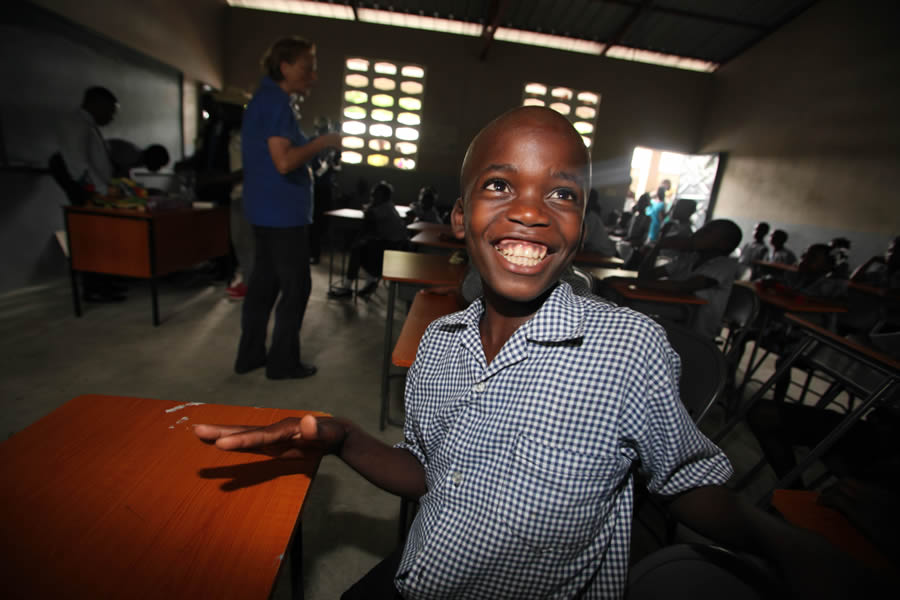Even after many visits to Haiti, Food For The Poor’s Director of Public Relations, Kathy Skipper, is moved to share the experience of her most recent journey of hope.
Falling into loving arms, we return to Haiti, embraced by smiles, heat, hugs and the haze of dirt and charcoal fires.
We won’t be here long this time, but we have big plans to visit two schools, one new and one just two years old that will be the setting for a longed-for reunion. We want to visit an orphanage, and we have arranged to visit another community that needs help. That is what is on our official agenda, but we have learned that Haiti always has more to offer and more to teach us than what we have planned.
[ngg_images source=”galleries” container_ids=”37″ display_type=”photocrati-nextgen_basic_slideshow” gallery_width=”600″ gallery_height=”425″ cycle_effect=”fade” cycle_interval=”8″ show_thumbnail_link=”0″ thumbnail_link_text=”[Show picture list]” order_by=”sortorder” order_direction=”ASC” returns=”included” maximum_entity_count=”500″]
Before we see them, we hear the schoolchildren and parents singing a welcome. We step from the four-wheel drives we have used to cross a riverbed, but our feet never touch the ground. We are swept along, tiny hands holding tightly to our own, leading us, showing us how their lives have been transformed. They pray for us in the relatively dark coolness of their community center, and we re-enter the light to share their stories. They show us their classrooms, including a computer lab that astounds us with its perfection and beauty. It could well be a spaceship, it looks so different from our first visit.
At the next school, the children once again escort us to a service of thanksgiving, but not before going by the new water station. Before the clean water, the children had to be lowered into dirty, rocky holes to scoop whatever was there that day. On a previous mission, the dangerous situation had shocked even veteran travelers. Having a clean water source means very different days now for the children, who spend their nights in sturdy homes and their days in vibrant classrooms. They no longer are the water-bearers.
The children receive a Creole Bible, thoughtfully tucked by the donors into plastic bags to keep out the rain, and they rush to the steps of the school to show off what they will take home that day. For many, it will be the first family Bible, for some the first book of any kind.
Their parents urge us to admire the goats, at home in a pen that surpasses most houses we have seen along the road that morning. These goats will help provide a secure future. They are part of the current of hope that runs here.
We meet a mother, recently rescued from rain, from rodents, from despair. As we are leaving her home, she waves from the porch filled with green plants, and turns with a shy smile to lock the door safely behind her.
Before we leave, we visit families still struggling. The men and women are quiet, and we wonder if it is from hunger, exhaustion, sheer desperation. It could be any one of these and it is so hard to tell on a hot, still afternoon with storm clouds threatening overhead. A child sips sugar water, the only thing his mother has to give him, and the sound of the spoon hitting the tin cup is the only thing we hear.
We walk up the hill, and we stay longer than we planned, seemingly unable to leave the side of a mother who holds her 3-week-old baby. Her mother-in-law, who is blind, sits near her. The mother has put a tiny hand-sewn orange cap on her baby’s head, but we know it will not offer much protection when darkness falls and the small family moves inside of the hole-filled shack where he was born.
We never make it to the orphanage, but we repack the gifts we have brought for someone else to deliver, confident in the knowledge that this is the day we were meant to experience.
Because we have been delayed, the ride back is dark, thoughtful, silent. There are no lights from the wood and tarp houses, no lamps along the highway. The embers from charcoal braziers offer brief blazes of light and scent as we pass. We flinch when oncoming headlights pass close by our van. The children run along the side of the highway, sweet in their playfulness, poignant in their vulnerability.
We reflect, we make silent promises, we watch the lights of Port-au-Prince begin to come into view. We think about our return.

